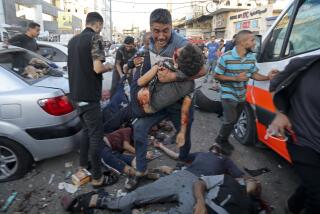EC Nations Recalling Envoys From Belgrade
- Share via
BRUSSELS — European Community foreign ministers decided Monday to recall their ambassadors from Belgrade for consultations and to seek the suspension of Yugoslavia from Europe’s main security forum.
The ministers also demanded the complete withdrawal of the Yugoslav federal army from Bosnia-Herzegovina or its total dissolution and the placing of its arms under international control.
A statement accused the army and the Belgrade authorities controlling it of bearing “by far the greatest share of blame” for the worsening situation in Bosnia-Herzegovina, both directly and indirectly by supporting Serbian irregulars.
The ministers said the Yugoslav delegation, now representing only Serbia and its ally Montenegro, should be suspended from the 52-nation Conference on Security and Cooperation in Europe until the end of June, when the situation would be reviewed.
“The killings and expulsion of populations in Bijeljina, Zvornik, Foca and other towns and villages, the siege and systematic shelling of Sarajevo, the holding of Sarajevo airport preventing even the safe passage of humanitarian relief from the ICRC (International Committee of the Red Cross) are actions deserving universal condemnation,” the statement said.
It urged the reopening of Sarajevo airport under conditions of safety to allow the distribution of urgently needed humanitarian aid.
Although the ministers pinned most of the blame for the Bosnian crisis squarely on the federal army and the authorities in Belgrade, they added that all parties had contributed in some way to the current situation.
The death toll in Bosnia-Herzegovina since fighting started in March was put at 1,320 by a government doctor in Sarajevo.
The EC statement said the consistent deterioration of the security situation cast doubt on the viability of any agreement that might be reached in faltering EC-sponsored constitutional talks between Serbs, Croats and Muslims--the three main ethnic groups in Bosnia.
Bosnia’s Serbian population largely opposed the former Yugoslav republic’s referendum vote in favor of independence, pitching the country into a deadly and complicated territorial dispute.
Asked what hope the latest EC measures have of curbing violence in Bosnia, British Foreign Secretary Douglas Hurd told a news conference: “Cease-fires are negotiated and broken. Agreements are negotiated and broken. You just have to persevere.”
The ministers also asked the EC’s Executive Commission to study possible economic sanctions against Belgrade and work toward its growing isolation in international forums.
More to Read
Sign up for Essential California
The most important California stories and recommendations in your inbox every morning.
You may occasionally receive promotional content from the Los Angeles Times.










